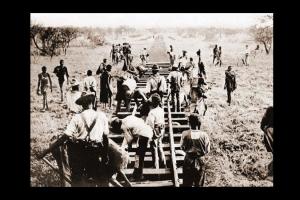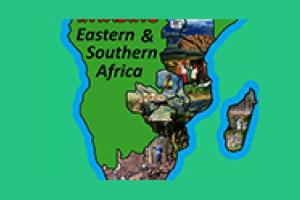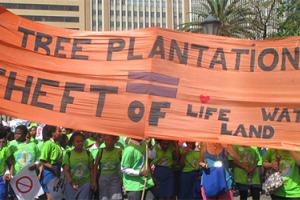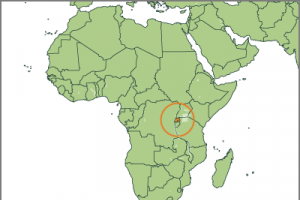In order to better understand peoples' struggles across the southern and eastern regions of Africa, reflecting on its history is crucial. This editorial highlights some parts of this history. And this, of course, is just the tip of the iceberg.
Rwanda
Bulletin articles
9 January 2018
Other information
9 January 2018
This briefing, compiled by the World Rainforest Movement (WRM) and the Timberwatch Coalition (TW), is now also available in Swahili. It focuses on various internal and external factors determining changes in the extent of land under industrial tree plantations in 11 eastern and southern African countries: Malawi, Mozambique, Zambia and Zimbabwe; Kenya, Tanzania and Uganda; South Africa, Swaziland and Lesotho; and Madagascar.
Bulletin articles
9 January 2018
This article gives an overview on the industrial tree plantation expansion threat in eastern and southern African countries, its external drivers, as well as the challenges this expansion presents to affected communities struggling to defend their land and livelihoods.
Bulletin articles
29 April 2009
The Batwa (often described as “pygmies”) are widely regarded as the original forest-dwelling inhabitants of the Equatorial forest in the Great Lakes Region comprising Uganda, Burundi, Rwanda and the Democratic Republic of Congo. In Uganda, they lived in the forest of the Mufumbira Mountains in the South West. They were hunter-gatherers that relied on the forests for their livelihood and found in the forests the sustenance for their spiritual and social life.
Bulletin articles
3 May 2003
In 1925 King Albert 1st of Belgium created a Protected Volcano Zone covering present Rwanda and the Democratic Republic of Congo, and this later became Albert National Park. In 1960 Albert Park was split into the Virunga Park, and the Parc des Volcans in northwest Rwanda. Both are important ecotourism sites due to their populations of endangered mountain gorillas.
Bulletin articles
7 September 2002
The indigenous inhabitants of Rwanda are the Twa, a ‘Pygmy’ people who originally lived as hunters and gatherers in the high altitude forests around the lakes in the Albertine Rift area of central Africa, in the present-day countries of Rwanda, Burundi, Uganda and Democratic Republic of Congo (DRC). In some parts of DRC, Twa are still able to live a forest-based existence. However, in most other areas the Twa have had to abandon their traditional way of life as their forests have been destroyed by logging, agriculture and "development" projects.
Bulletin articles
18 May 2000
The World Bank first and the Hutu-Tutsi civil war later have led the Batwa pigmies to near extinction and years of suffering, without this being reported by the world mass media.




